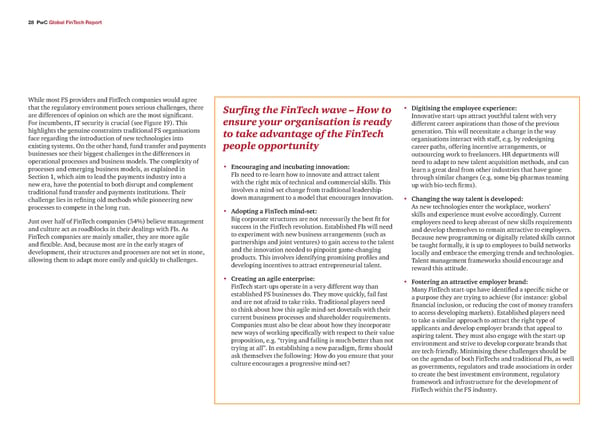2‰ PwC Global FinTech Report While most FS providers and FinTech companies would agree that the regulatory environment poses serious challenges, there Surfing the FinTech wave – How to • Digitising the employee experience: are differences of opinion on which are the most significant. Innovative start-ups attract youthful talent with very For incumbents, IT security is crucial (see Figure 19). This ensure your organisation is ready different career aspirations than those of the previous highlights the genuine constraints traditional FS organisations to take advantage of the FinTech generation. This will necessitate a change in the way face regarding the introduction of new technologies into organisations interact with staff, e.g. by redesigning existing systems. On the other hand, fund transfer and payments people opportunity career paths, offering incentive arrangements, or businesses see their biggest challenges in the differences in outsourcing work to freelancers. HR departments will operational processes and business models. The complexity of • Encouraging and incubating innovation: need to adapt to new talent acquisition methods, and can processes and emerging business models, as explained in FIs need to re-learn how to innovate and attract talent learn a great deal from other industries that have gone Section 1, which aim to lead the payments industry into a with the right mix of technical and commercial skills. This through similar changes (e.g. some big-pharmas teaming new era, have the potential to both disrupt and complement involves a mind-set change from traditional leadership- up with bio-tech firms). traditional fund transfer and payments institutions. Their down management to a model that encourages innovation. challenge lies in refining old methods while pioneering new • Changing the way talent is developed: processes to compete in the long run. • Adopting a FinTech mind-set: As new technologies enter the workplace, workers’ Big corporate structures are not necessarily the best fit for skills and experience must evolve accordingly. Current Just over half of FinTech companies (54%) believe management success in the FinTech revolution. Established FIs will need employees need to keep abreast of new skills requirements and culture act as roadblocks in their dealings with FIs. As to experiment with new business arrangements (such as and develop themselves to remain attractive to employers. FinTech companies are mainly smaller, they are more agile partnerships and joint ventures) to gain access to the talent Because new programming or digitally related skills cannot and flexible. And, because most are in the early stages of and the innovation needed to pinpoint game-changing be taught formally, it is up to employees to build networks development, their structures and processes are not set in stone, products. This involves identifying promising profiles and locally and embrace the emerging trends and technologies. allowing them to adapt more easily and quickly to challenges. developing incentives to attract entrepreneurial talent. Talent management frameworks should encourage and reward this attitude. • Creating an agile enterprise: • Fostering an attractive employer brand: FinTech start-ups operate in a very different way than Many FinTech start-ups have identified a specific niche or established FS businesses do. They move quickly, fail fast a purpose they are trying to achieve (for instance: global and are not afraid to take risks. Traditional players need financial inclusion, or reducing the cost of money transfers to think about how this agile mind-set dovetails with their to access developing markets). Established players need current business processes and shareholder requirements. to take a similar approach to attract the right type of Companies must also be clear about how they incorporate applicants and develop employer brands that appeal to new ways of working specifically with respect to their value aspiring talent. They must also engage with the start-up proposition, e.g. “trying and failing is much better than not environment and strive to develop corporate brands that trying at all”. In establishing a new paradigm, firms should are tech-friendly. Minimising these challenges should be ask themselves the following: How do you ensure that your on the agendas of both FinTechs and traditional FIs, as well culture encourages a progressive mind-set? as governments, regulators and trade associations in order to create the best investment environment, regulatory framework and infrastructure for the development of FinTech within the FS industry.
 Global FinTech Report Page 36 Page 38
Global FinTech Report Page 36 Page 38